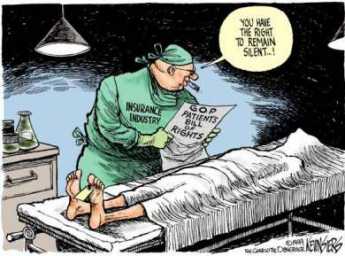Related Topics
Insurance in Philadelphia
Early Philadelphia took a lead in insurance innovation. Some ideas, like life insurance, flourished. Others have faded.
Clinton Plan Summary: Effects on National Health

|
| health care |
The huge 19th Century professional battle about homeopathy demonstrated that. not only is it possible to do the right thing for the wrong reason, but it is also possible to make briefly improved outcomes emerge from a silly approach. In general, the medical professional focus on the quality of care rendered is founded on an article of faith. It is assumed that if you do the right thing well enough and often enough, aggregate patient health will improve. Unfortunately, the probably better health of the American public in the past two decades was in spite of, not because of, the changes employers forced on the organization and financing of the medical system.
Life expectancy of persons who attain age 65 appears to have lengthened by three years in the past ten. A significant component of this totally unprecedented event lies in the fact that the mortality rate from cardiac disease has fallen fifty percent in five years. About half of this decline in deaths is due to preventative measures, about half due to rescue and repair. It seems almost certain that a longer time period will see an increasing benefit from prevention, and therefore a further decrease in mortality from heart disease is probable. And a huge decrease in medical costs.
When improvements of this magnitude are taking place, it is impossible to judge whether comparatively trivial effects are taking place in the opposite direction, propelled by employer meddling in the health system, and associated insurance torment of the provider community. Because it is impossible to test conflicting assertions, it is futile to make them. The concurrent malpractice mess provides a useful example, however. It is now just about impossible to deliver a baby in the nation's capital because obstetricians have shifted their practices across the Potomac River to Virginia. The premiums for malpractice insurance reflect the differences in judge and jury selection within the District of Columbia, compared with Virginia. Philadelphia is similarly situated across a river from another state, and migration of obstetrics to New Jersey is plainly evident. One would not expect infant mortality rates to show much difference, so it is possible for a determined partisan to shrug off the matter; that's plainly wrong. The approach of examining statistical outcomes data is not going to resolve this issue, whether the point under debate is malpractice or managed care.
The matter is further compounded by patient cooperation, and here we rely on Benjamin Franklin's advice to abandon logic and just tell stories. It is widely repeated in conversational medical circles that Bill Clinton himself was given statin pills to prevent heart attacks. He took them for a while, and then quit, following which he soon needed to be admitted to Columbia Presbyterian Hospital my old alma mater, for cardiac by-pass surgery. He thus converted inexpensive prevention into a very expensive repair.
Perhaps, when he and his wife were redesigning the American health financing system, they should have included a provision that those who do such things should pay for it themselves.
Originally published: Friday, August 03, 2007; most-recently modified: Wednesday, May 15, 2019